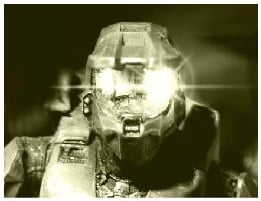Jake Courage
From Halopedia, the Halo wiki
| This article contains information about a non-canonical subject that, while official, is not part of the established Halo universe. |
Template:Character Infobox Jake Courage was a groundbreaking British war photographer, known for documenting the Second Battle of Mombasa.[1]
Background
| This section does not have enough inline citations and/or does not adhere to the proper citation format. You can help Halopedia by adding citations. |
Courage's career began in 2527 as a photojournalist on Reach, where he was well known for his shocking and uncompromising style of photography. Many of his photos won awards – including his most famous, 'Killing Time', which won him the John Pilger Prize in 2530.
He remained on Reach for five years until a disagreement with his editor. Although the details remain ambiguous, it is believed that Courage wanted to print a series of pictures from a deadly Grunt attack. His editor refused on the grounds that they were too graphic, causing Jake Courage to leave the paper and stage his own exhibition. The photos won him critical acclaim and set him up as a well-respected war photographer.
From 2532 onwards he continued to expose the truth behind war with harrowing pictures of some of the galaxy’s bloodiest battles. It was during this time that he earned the trust and respect of the 77th Marine Regiment, including war hero Master Chief Petty Officer John-117 – to whom he became a loyal companion.
The photos covering the Second Battle of New Mombasa in 2552 are undoubtedly his most famous. His unlimited access to the UNSC regiment resulted in a series of photographs that enabled the world to see the heroic acts of the soldiers in battle – including John-117. In a quote from Jake Courage taken during the battle, he said, "I’ve got to know these soldiers’ lives intimately. One man, I consider my friend... he is the human face of war. He is Spartan 117, he is Master Chief."

This was also the last photo he ever took, as he was killed in that very same battle by a grenade. He left behind a wife, Mary, and a son, John, whom he presumably named after the Spartan.[1]
After the war, his collection of photography from the battle, titled 'Shooting a Hero', was displayed throughout Great Britain.
Controversy
- "I hate blood and I hate violence. So what possessed me to choose to be a war photographer? Because I’m drawn to heroes. I’m drawn to the selfless act of someone putting their own life on the line for the sake of humanity. Because amongst the horror and the madness, I like to think I can show that some good can come out of something so horrific."
- — Jake Courage in October 2552, before heading to the Second Battle of New Mombasa
Courage’s photos have always been the subject of some controversy, suffering under the argument that war photography can desensitize the public to scenes of violence and death. However, Courage always argued the power of the image can make more noise and have a greater impact than a gun can ever have.
Awards
- The John Pilger Prize for 'Killing Time' in 2530.
- The International War Photography Prize for 'Screams in Space' in 2529 and 'Dead on Arrival' in 2538.
- The MoH Lifetime Achievement Award for 'Flies on Flesh' in 2534.
- Gold Medal in the WPP Awards in 2543.
Photography equipment
Traditionally, war photographers use an inbuilt retina camera or helmet-cam; however, Courage preferred more traditional methods that enabled him to have more control over his landscape. He mainly used a Dynamo 507 3D with ultra 4Res lens and quadric digital transfer. The 900 nanosecond transfer rate enabled photos to be transferred back to base instantly. His equipment was always coated in a substance made from titanium and cockroach shell that enabled it to withstand the radiation. It should also be noted that he preferred to shoot in an archaic sepia tone instead of full tonal color.
Existence
Jake Courage's very existence is suspect. If he did exist, his images would undoubtedly be altered by the Office of Naval Intelligence's Section Two due to their graphic content. It seems unlikely that any Spartan, especially John-117, would have befriended a civilian. Another case against his being is his surname, "Courage", which suggests that his existence was fabricated for propaganda purposes.